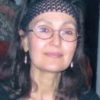
Heads Up
Selma Gokcen
“In order to change the world, you have to get your head together first.”
—Jimi Hendrix
Here is a question for you…what is the foundation of good balanced movement at the cello? There are many answers and many ways of defining balance and coordinated movement. The CelloBello website offers some great advice here.
In this short blog, I propose to turn the question on its head, as we do in our work as Alexander Technique teachers.
“How can we prevent interference with our balance?” And by defining what gets in the way of balancing ourselves with the cello, we can discover what to let go.
Years ago, in my student days, I gradually made the discovery that something in my bow arm wasn’t working. For years I tried to correct the problem directly and became obsessed with the arm, wrist, hand and fingers when all along the answer lay outside this circumscribed territory. It’s like the Sufi story of the Mullah looking for the key by the lamppost because that’s where the light is.
The complications of my bow arm lay elsewhere; as one of my first Alexander teachers said to me: “Tension occurs in patterns, not places.” Alexander found his vocal troubles originated in the way he pulled his head back and down, pushing his back forward when he wanted to recite. This pattern manifested in the whole body—right down to his feet pulling up from the floor from the strain of exerting so much effort.
When I began my Alexander training, I found (and still find!) patterns of tension which originate in the pulling forward and down of my head and which immediately cause a tightening in the bow arm. It’s a very old pattern which often returns when I am revising pieces learned many years ago. But as I watch other cellists, I see that it is not an uncommon problem. Balancing the weight of the head (4.5 kg/10-11 lb) on top of the spine requires that we not interfere with the larger relationship of the head to the body. The head has to balance upward of the spine, not pulled down into the spine and shortening the back of the neck. Next time you are in the supermarket, pick up a 5 lb-bag of potatoes—and then another in the same hand—and you will feel the amount of weight you are carrying upstairs. Almost unbelievable!
When you shift into the higher positions on the cello, playing right on top of the bridge, have a look in the mirror…where did your head go just then? And when you play a chord fortissimo? And when…and when… and when? The interference can occur anywhere, at any time. It’s an ongoing challenge not to get in the way of ourselves. But paying attention to it, we can gradually stop the interference. It just takes time and the willingness to look.
Subjects: Playing Healthy, Practicing
